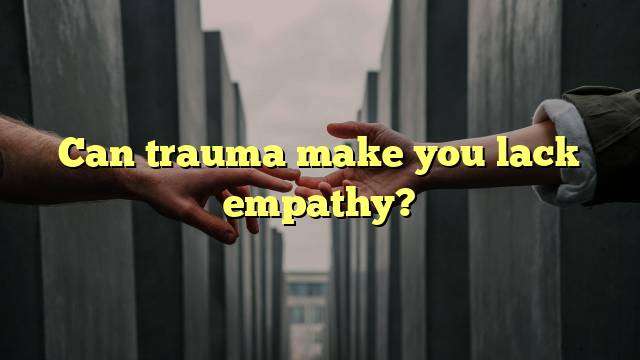Can Trauma Make You Lack Empathy?
Trauma can have a profound impact on a person’s ability to maintain empathetic relationships. Trauma survivors with Post-Traumatic Stress Disorder (PTSD) experience social interaction and relationship impairments that can be directly attributed to the traumatic event. The physiological and psychological effects of trauma can have a lasting impact on a person’s ability to interact and connect with others emotionally.
What is Empathy?
Empathy is the capacity to recognize and understand another person’s feelings, experiences, and perspectives. It is a complex emotion that requires a deep level of understanding and connection with another person’s emotions and feelings. Empathy is an important part of communication and relationship-building, as it allows people to connect on a deeper level and form bonds that are meaningful and lasting.
How Can Trauma Affect Empathy?
It is hypothesized that traumatic experiences can lead to impairments in an individual’s ability to empathize with others. Individuals who have experienced trauma may struggle to connect with others emotionally, as they may be unable to process or relate to the emotions of those around them. This lack of empathy can lead to difficulties in sharing affective, emotional, or cognitive states with others, making it difficult to form meaningful relationships.
In addition, individuals who have experienced trauma may be more likely to experience a range of symptoms associated with PTSD, such as hypervigilance, avoidance, intrusive memories, and difficulty regulating emotions. These symptoms can have a direct impact on an individual’s ability to empathize. For example, individuals who are hypervigilant may be unable to connect with others on an emotional level, as they are constantly on alert for potential danger. Similarly, individuals who experience intrusive memories may be unable to fully engage in conversations and form meaningful relationships, as they are preoccupied with the traumatic event.
What Can be Done to Address Trauma-Related Impairments in Empathy?
There are a number of strategies that can be employed to address trauma-related impairments in empathy. First and foremost, it is important that individuals who have experienced trauma receive appropriate support and treatment. Cognitive-Behavioral Therapy (CBT) is a type of psychotherapy that can be particularly effective in helping individuals process and manage their symptoms of PTSD, as well as the underlying trauma. Additionally, medications such as selective serotonin reuptake inhibitors (SSRIs) can be used to help regulate emotions and manage symptoms.
In addition to treatment, individuals can also benefit from connecting with others who have experienced similar trauma. Support groups, therapy groups, and online forums can provide a safe space for individuals to share their experiences and form meaningful connections. Additionally, individuals can benefit from participating in activities that foster empathy, such as volunteering, engaging in creative activities, or engaging in meaningful conversations.
Finally, it is important to recognize that trauma-related impairments in empathy are not permanent, and individuals can learn to reconnect with others and form meaningful relationships. With the right treatment and support, individuals can learn to manage their symptoms and foster meaningful connections with others.
Conclusion
Trauma can have a profound impact on an individual’s ability to empathize with others, leading to impairments in social interaction and relationship-building. However, it is important to recognize that these impairments are not permanent, and individuals can learn to manage their symptoms and foster meaningful connections with others. With the right treatment and support, individuals can learn to reconnect with others and form lasting relationships.



